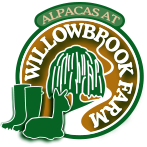Indigenous to South America where they were a cherished treasure of the ancient Incan culture, Alpacas are members of the camelid (camel) family. There are two different breed types the huacaya and the suri. Although very similar physiologically the main difference between the two types, their fleece, is very easy to see. The huacaya has a crimped fleece which gives the animal a fluffy appearance. The suri has no crimp in its fleece and the fiber forms pencil like locks which hang gently from the body. Alpacas are on average 36 inches tall at the withers and weigh between 120 – 200 pounds as adults. The life span of an alpaca averages between 20 to 25 years. The females produce one baby (cria) per year with the average gestation period being 345 days. Crias generally weigh from 12 to 19 pounds at birth and are usually up on their feet and nursing within 3 to 4 hours of birth. The alpaca diet consists of grass and hay with pellet supplements and free choice minerals also a part of the daily diet. Alpacas are ruminants. They produce rumen and chew their cud enabling them to process a modest amount of food, about 2% of their body weight, very efficiently. Stocking density ranges from 6 to 10 animals per acre depending on the availability and quality of pasture. Alpacas need shelter from the elements and should be provided with a shed or barn. Males and females are kept separately. Alpacas are timid herd animals but they can be easily trained. Halter training usually begins when the cria is still young. This makes for ease of handling in all situations and also prepares them for the show ring. Alpacas are generally healthy but as with other animals need to be wormed and vaccinated to minimize parasites and disease. Toe nail trimming is also required on a regular basis. Alpacas are raised for their luxurious fiber. They should be shorn once a year by an experienced shearer both to harvest the fleece and to ensure the comfort and health of the animal. In the U.S. alpacas are DNA tested and registered by the Alpaca Registry which keeps the database of the national herd. The Alpaca Owners Association is the national organization that supports alpaca breeders providing marketing, a national show system and an annual national conference which includes educational seminars and workshops.
